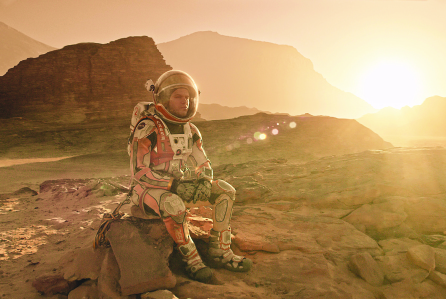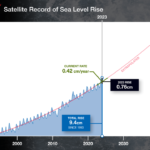May 21, 2018 – In the latest speculation about the colonization of Mars, researchers from Poland, Brazil, and the United States, conclude that a human settlement on Mars would likely be unable to reproduce successfully, ultimately leading to colony collapse. Appearing in the journal Futures, the article entitled “Biological and social challenges of human reproduction in a long-term Mars base” concludes that human babies as we know them wouldn’t stand a chance surviving on the Red Planet.
Why? Because of radiation.
Mars lacks an atmosphere thick enough to shield colonists from solar radiation.
And Mars lacks the magnetic field that shields life here on Earth from cosmic radiation.
The likelihood of a baby surviving from conception to birth in the face of these threats, let alone anything else that the planet would throw at colonists, is dire. In the paper the researchers describe even fertilization, let alone successful fetal growth, as near miraculous under the harsh reality of Mars.
The researchers neglect to look at an alternative to living on the surface of Mars. Establishing human colonies underground using subterranean caves of which several possible candidates have already been identified, could prove to be the best defense against the radiation sources described above. Although a much harder life than the worst environments found here on Earth (think Antarctica), the colonists would at least not have to deal with cosmic bombardment.
And there is a second answer to the problem of human reproduction on Mars, that is, not to colonize the planet with humans as we know them, but to re-engineer our genome to withstand Martian conditions. We could begin to do this right here on Earth in anticipation of sending a genetically reprogrammed human who capable of surviving on Mars. In other words, we would be creating Martians.
That engineering could go one step further. We could alter the human genome for other living conditions, not just Mars. For example, we could create spacefarers capable of surviving long journeys throughout the Solar System so that solar flares and cosmic radiation would no longer threaten them in transit. Even better, we could create re-engineered humans who could live permanently in space habitats capable of thriving and reproducing in these self-sustaining enclosed worlds of our making.
As for the Martians we create here on Earth, once they get to Mars and have the opportunity to reproduce then evolution can take over. These Martians in reproducing should see the best traits passed on to their children, genetic characteristics that will ensure their survival. Martians born on Mars may eventual acclimate to low gravity and a thin atmosphere. And perhaps, with accelerated genetic re-engineering, one day the descendants of these first Martians may walk on the planet’s surface without space suits.
Back in 2012, I posted a piece to this site arguing the potential of re-engineering humans in light of climate change here on Earth. The merits of the case stated that our human population would soon exceed 9 billion putting incredible pressure on resources here on Earth. Thus it seemed it would be better to change us by making us smaller, turning us into vegans (meat intolerant), making us less reproductively prolific, and making us more socially sympathetic to our fellow members of the species as well as to all other life.
Although this argument was suggested as a better option in light of proposals to geoengineer our planet, it would seem, as an option for human settlement of Mars genetic engineering Martians makes sense. In the end, it means humans would not become the multi-planetary species that Elon Musk describes as the rationale for going to Mars in the first place. A re-engineered human as Martian would probably be incapable of interbreeding with humans from Earth, or if offspring were to be viable, it is unlikely they could survive on either planet.
















